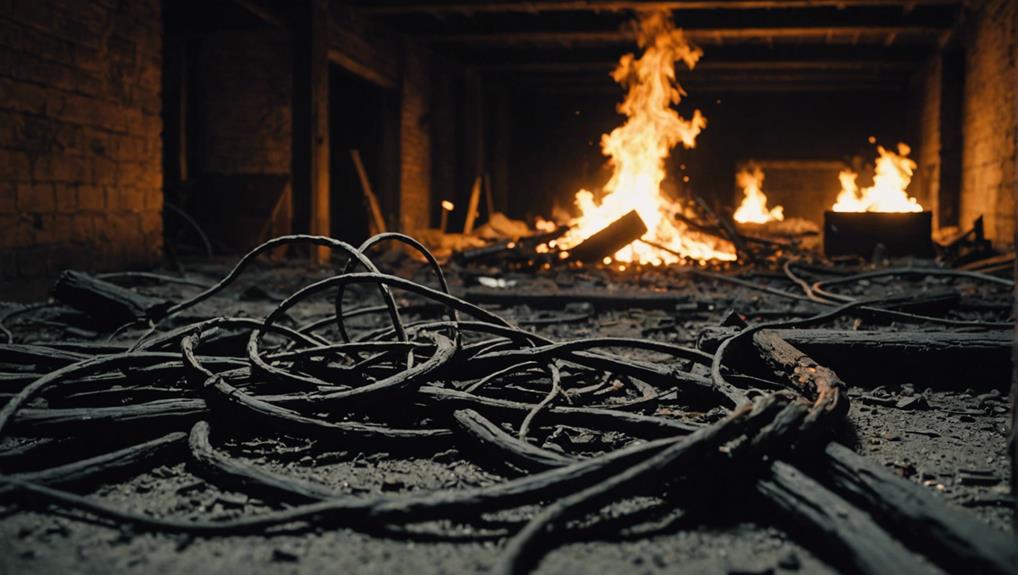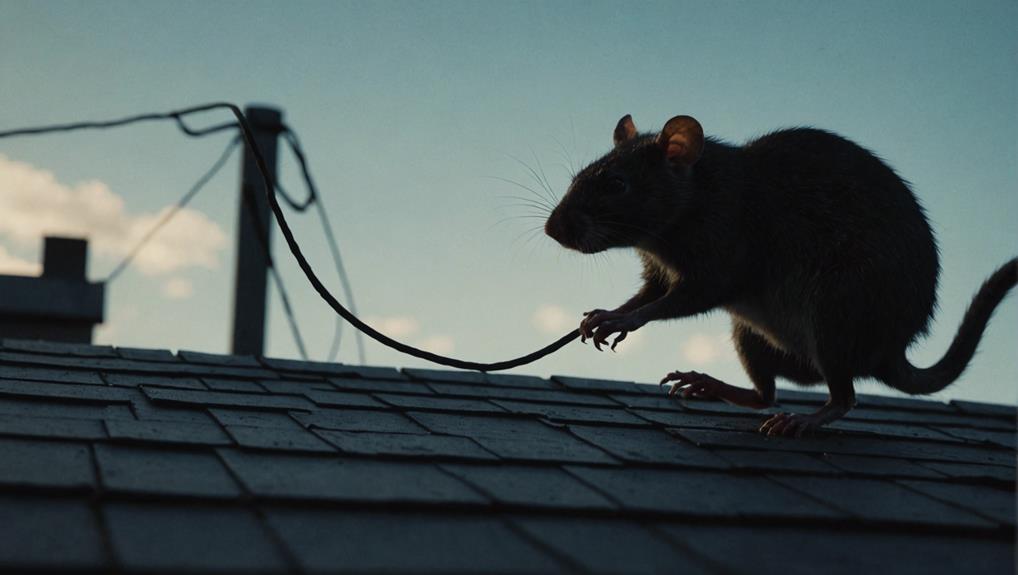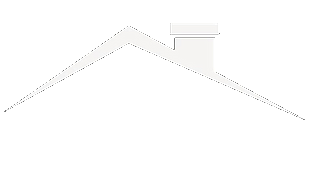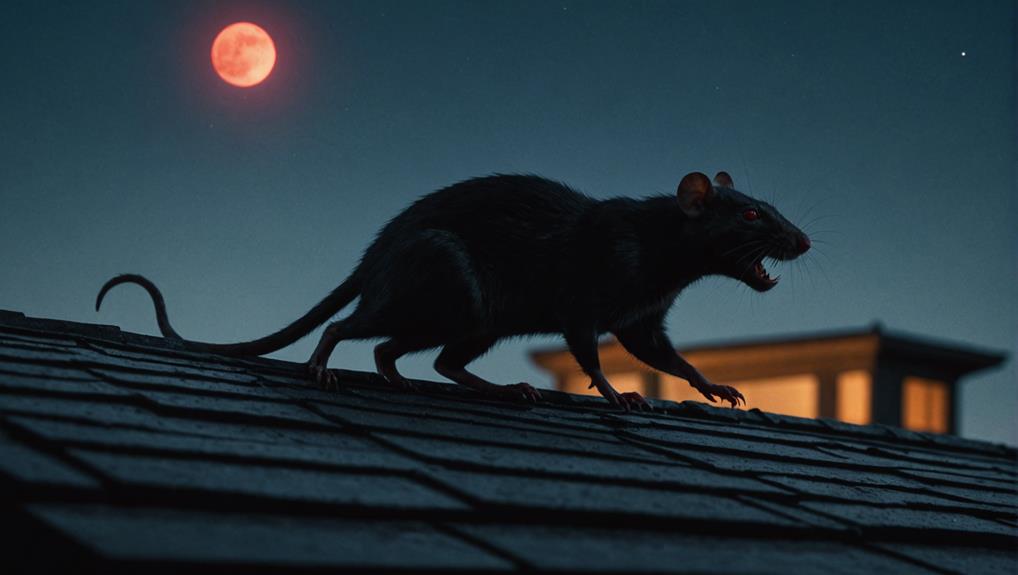You may not be aware that roof rats are not just a nuisance but also a serious threat to your well-being and property. These rodents, often underestimated, can wreak havoc in more ways than one. From spreading diseases to causing structural damage, the dangers they bring can be far-reaching. Understanding the full scope of these risks is vital in safeguarding your health and securing your home.
Key Takeaways
- Roof rats transmit diseases like rat-bite fever and hantavirus, posing health risks.
- Gnaw through various materials, leading to property damage and potential structural issues.
- Roof rat gnawing on wires increases fire hazards and appliance malfunctions.
- Display aggression when threatened, increasing risks of bites or scratches.
- Prompt response is crucial to prevent health hazards, property damage, and fire risks associated with roof rats.
Health Risks Associated With Roof Rats
Exposing yourself to roof rats can pose significant health risks due to their ability to transmit various diseases to humans through direct contact or contaminated surfaces. These dangers stem from the potential transmission of diseases like rat-bite fever, leptospirosis, and hantavirus. Roof rats can also indirectly spread illnesses such as salmonellosis and murine typhus through fleas that they carry. The aggressive nature of roof rats, especially when cornered, increases the likelihood of bites or scratches, further elevating the risk of disease transmission. Additionally, consuming food or water that has been contaminated by roof rat feces can result in severe health issues like salmonellosis and leptospirosis.
In addition, roof rats may harbor ectoparasites like the tropical rat louse and spiny rat mite, which can cause itching, skin irritation, and transmit diseases to humans. Hence, it's important to take preventive measures to avoid direct contact with roof rats or surfaces they've contaminated to mitigate the health risks associated with these disease-carrying pests.
Property Damage Caused by Roof Rats
Roof rats' destructive behavior extends beyond health concerns, as they can cause significant property damage by gnawing through various materials and compromising the structural integrity of buildings. These rodents, adept at chewing through wood, plastic, aluminum, concrete, and even steel, pose a threat to the stability of your property. By creating pathways in walls, nesting in attics, and chewing on electrical wires, they increase the risk of appliance malfunctions and potential fires.
Damage to PVC water pipes can lead to leaks and floods, weakening the property's overall structure. Burrowing under houses can compromise foundations, while nests in the attic contribute to significant structural damage. Repairing the harm caused by roof rats can result in costly bills, underscoring the importance of prevention and early intervention to safeguard your property against these destructive pests.
Regular inspections, sealing entry points, and maintaining cleanliness are key steps in preventing roof rat-induced property damage.
Fire Hazards From Roof Rat Gnawing

To mitigate the risk of potential fires in your home, it is essential to address the fire hazards stemming from roof rats' gnawing behavior on electrical wires. Roof rats have a tendency to chew on wires, which can lead to power shortages, appliance malfunctions, and even electrical fires. The table below outlines the key points related to fire hazards caused by roof rats' gnawing on electrical wires:
| Key Points | Details | Importance |
|---|---|---|
| Roof rats gnaw on wires | Increases risk of fires and power shorts in homes | High |
| Chewing behavior consequences | Can lead to appliance malfunctions and electrical hazards | Medium |
| Damage and safety risks | Result in costly repairs and potential safety hazards | High |
| Prevention is crucial | Avoids fire hazards caused by roof rats' gnawing behavior | High |
| Professional intervention | Recommended to address roof rat infestations and mitigate fire risks from their gnawing | High |
Taking proactive steps to prevent roof rat infestations and seeking professional help can significantly reduce the risk of fire hazards in your home.
Aggressive Behavior of Roof Rats
Have you ever wondered what triggers the aggressive behavior of roof rats?
Roof rats can display aggression when they feel threatened, especially in situations where their nests or territory are perceived to be at risk.
When cornered or with their young to protect, roof rats may resort to biting or scratching as a defense mechanism.
These aggressive encounters can pose risks to humans and pets nearby, making it vital to understand the signs of aggression exhibited by roof rats.
Being able to recognize these signs can help in effectively handling infestations and minimizing potential harm.
It's important to approach any suspected roof rat infestation with caution and seek professional assistance to safely address the situation.
Importance of Prompt Roof Rat Infestation Response

Responding promptly to a roof rat infestation is vital to mitigate potential property damage and health hazards. Roof rats are notorious for their ability to chew through wires, insulation, and wooden structures, creating fire risks and necessitating expensive repairs if not addressed swiftly.
Taking immediate action is essential in containing the rapid reproduction of these pests, preventing widespread infestations that can escalate the problem. Early recognition of signs such as scratching noises and droppings can aid in promptly dealing with the issue before it worsens.
It's highly advisable to seek professional help for the effective removal of roof rats from your premises to ensure thorough eradication. Professionals have the expertise and tools to handle infestations efficiently, minimizing the risks associated with these pests.
Frequently Asked Questions
How Dangerous Are Roof Rats?
Roof rats are dangerous due to health risks they pose. They carry diseases, cause property damage, and spread contamination. Their nesting behaviors and signs of infestation require preventive measures. Consider the environmental impact of dealing with them.
Can Roof Rats Make You Sick?
Roof rats can make you sick through disease transmission, posing health risks. Contaminated food and water can lead to serious illnesses. Prevention is essential. Be aware of symptoms, seek treatment, and consider the public health impact.
Do Roof Rats Bite Humans?
Yes, roof rats can bite humans. Their bites can transmit diseases and lead to infections. Seeking medical attention is essential after a bite to prevent complications. Prevent infestations to reduce the risk of bites and related health issues.
Are Roof Rats Hard to Get Rid Of?
When dealing with roof rats, you'll find that their elusive nature and quick breeding habits can make them quite a challenge to eliminate. Utilizing prevention methods and seeking professional pest control services are key.
Conclusion
To sum up, the presence of roof rats in your home poses a ticking time bomb of health risks and property damage. These sneaky rodents are like silent saboteurs, ready to strike at any moment.
Don't wait for disaster to strike – take swift action to eliminate these threats before they've a chance to wreak havoc on your life. Stay vigilant and protect yourself from the dangers that lurk above.



